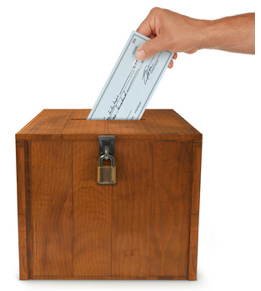Charitable Contributions Alert!
Mark Helland
Mark Helland, CPA is a partner with the public accounting firm of Elliott, Dozier and Helland, PC which is located in Tulsa, Oklahoma. Mark specializes in audit and tax related issues for non-profits, churches, ministries and pastors across the United States. Mark’s firm works with hundreds of churches and ministries and is available for assistance on any issues you might have. To talk with Mark on this topic or for assistance on any other tax, accounting or church audit and compliance need, Mark can be contacted via email at mark@edandhcpa.com or by phone at 888-893-1259 or 918-627-2286.
 Over the past few years, we have seen a trend in the Internal Revenue Service (“IRS”) performing more audits and generally becoming much tougher in terms of its enforcement efforts—i.e. more audits, IRS notices, penalties, etc. Given the massive U.S. national debt, we fully expect this trend to continue into the future. One area where we have seen tougher enforcement, and expect to see ongoing tough standards, is in the area of documentation of charitable contributions.
Over the past few years, we have seen a trend in the Internal Revenue Service (“IRS”) performing more audits and generally becoming much tougher in terms of its enforcement efforts—i.e. more audits, IRS notices, penalties, etc. Given the massive U.S. national debt, we fully expect this trend to continue into the future. One area where we have seen tougher enforcement, and expect to see ongoing tough standards, is in the area of documentation of charitable contributions.
In fact, based on IRS “desk audits” we have seen of late, documentation requirements for taxpayers who itemize deductions and hope to deduct cash and non-cash contributions have increased dramatically. Here are a few of the key requirements that you need to be aware of for charitable contribution deductions:
- Per IRS requirements, all cash charitable contributions must be documented by a written receipt. Furthermore, your tax preparer must be able to review a copy of this documentation in order to claim the deduction.
- The IRS’s definition of a “written receipt” is very stringent. For contributions of $250 or less, a cancelled check or credit card statement will suffice, but written documentation from the charity is encouraged. For contributions greater than $250, an acceptable written receipt is a receipt/acknowledgement received directly from the charity. Unacceptable documentation would include copies of checks, hand written entries in client tax organizers, pay-stubs for payroll deductions, etc.
- The IRS has additional requirements for written receipts. The IRS is strongly enforcing rules that three primary items must be included on written receipts issued by charities to donors:
-
- The receipt must be on the charity’s letterhead
- The receipt must include the wording, “No goods or services were received in consideration of this gift” and
- The receipt must be “contemporaneous.” Contemporaneous is defined as being obtained by the taxpayer by the due date (including extensions) or the filing date of the tax return, whichever is earlier. More to come on these requirements, below
- Non-cash contributions under $5,000 must be documented on a printed receipt from the charity and the item(s) donated must be in “good” condition and need to be in an itemized list format. Many additional requirements exist for donations of vehicles and/or for deductions valued in excess of $5,000 which are beyond the scope of this article.
The requirements listed above in item number three (#3) are critical for churches and ministries as they produce annual written donation statements for donors. Failure to follow these requirements can cause a huge headache for donors who are audited by the IRS. A recent Tax Court case (Durden, T.C. Memo. 2012-140) underscores how serious the IRS is about these basic requirements. In this case, the Tax Court upheld a disallowance of itemized deductions in excess of $22,000 of a couple solely for the lack of a contemporaneous statement from their church. The taxpayers, David and Verdona Durden, produced a letter from their church acknowledging $22,517 in contributions and provided cancelled checks to this effect. However the IRS rejected the acknowledgement solely because it lacked the “no goods or services” statement as mentioned above. The Durdens then obtained a second letter from their church that contained the same information as before, plus the statement. The IRS then again denied the deduction (of $22,000+!) due to the fact that the letter from the church was not “contemporaneous”! So, the lesson here is that you must have the right documentation when challenged by the IRS—if inadequate documentation is provided to the IRS in this area, there are no “do-over’s”!
In summary, a taxpayer’s ability to claim a charitable contribution deduction hinges on the ability to obtain the documentation that is required by the IRS. All charitable organizations should take careful note of this and be sure that annual donation acknowledgements will pass muster with the IRS by possessing all required elements. Failure to do so could leave you in hot water with donors if the IRS decides to question their charitable contributions!
This article is designed to provide accurate and authoritative information in regard to the subject matter covered. It is shared with the understanding that neither the author nor Tony Cooke Ministries is engaged in rendering legal, accounting, psychological, medical or other professional services. Laws and regulations are continually changing, and can vary according to location and time. No representation is made that the information herein is applicable for all locations and times. If legal advice or other expert assistance is required, the services of a competent professional person should be sought.


